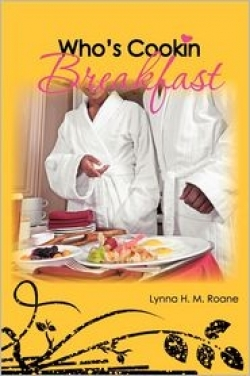Who's Cookin Breakfast
lvis’ famous lines, “Love me tender, love me true,” serve as the central tenet of Lynna Roane’s Who’s Cookin Breakfast. The author, a licensed practical nurse (LPN) with a bachelor’s degree in business management, acknowledges that she penned her morality play for those who need to learn the difference between “having sex” and “making love.”
Her book provides synopses of the lives of three couples as their relationships move from acquaintance status to sexual relations and beyond. Asia (from a dysfunctional family) and Antonio learn how to be respectful of one another. Malan (pregnant as a result of being raped by her mother’s boyfriend) and Andrew learn how to transcend life’s most difficult lessons. Paris (a young doctor involved with a scam-artist businessman) and Andre (an NFL player living with a lap dancer) search hopelessly for meaningful relationships until they reconnect with each other.
While Roane may have meant her book to be a healthy relationships version of Life’s Little Instruction Book by H. Jackson Brown, it misses the mark for several reasons. It is confusing in format and language, curiously vague in places, and marred by grammatical and typographical errors. And Roane’s sex scenes are awkward at best and tawdry at worst.
It is a truism that “sex sells,” but in order for a book’s sales to jump because of the sexual encounters it describes, there must be something erotic or sensual, salacious or literary about those scenes. Roane’s passages detailing sexual encounters are mechanical and stilted. For example: “Asia found the baton that was firmly pressed against my boxers trying to get out.”
Another problem is Roane’s writing style, which often obfuscates. “‘Don’t leave … ’ was something I heard every night and early morning, after my brain had descended to my other head,” says Andrew. “Why should I come when the one reason I’m up here is giving up?” asks Antonio.
The book’s structure is problematic, too. Roane chose to intermingle the protagonists’ stories across three relationship phases: “getting acquainted,” “the first time,” and “the first time, again.” This approach is confusing for readers, who must continually flip back and forth across pages and chapters in order to discern the history of the particular relationship being described.
A final section is intended to delineate the differences among the three relationships. Yet readers are left with the impression that the relationships are more similar than different. All three couples get married, buy a house, and have a baby.
Roane’s purpose in writing Who’s Cookin Breakfast is a worthy one. We live in a world filled with violence, abusive relationships, and individuals who use other people. A story that teaches tenderness and commitment in navigating relationships is a welcome addition to the market.
Reviewed by
Nancy Walker
Disclosure: This article is not an endorsement, but a review. The publisher of this book provided free copies of the book and paid a small fee to have their book reviewed by a professional reviewer. Foreword Reviews and Clarion Reviews make no guarantee that the publisher will receive a positive review. Foreword Magazine, Inc. is disclosing this in accordance with the Federal Trade Commission’s 16 CFR, Part 255.

